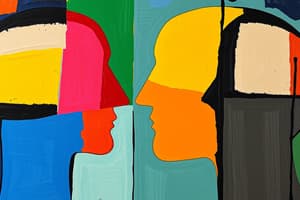Podcast
Questions and Answers
What is social psychology?
What is social psychology?
The scientific study of how we think about, influence, and relate to one another.
What is attribution theory?
What is attribution theory?
The theory that we explain someone's behavior by crediting either the situation or the person's disposition.
What is fundamental attribution error?
What is fundamental attribution error?
The tendency for observers, when analyzing another's behavior, to underestimate the impact of the situation and to overestimate the impact of personal disposition.
What is an attitude?
What is an attitude?
What is peripheral route persuasion?
What is peripheral route persuasion?
What is central route persuasion?
What is central route persuasion?
What is foot in the door phenomenon?
What is foot in the door phenomenon?
What is a role in social psychology?
What is a role in social psychology?
What is cognitive dissonance theory?
What is cognitive dissonance theory?
What is conformity?
What is conformity?
What is normative social influence?
What is normative social influence?
What is informational social influence?
What is informational social influence?
What is social facilitation?
What is social facilitation?
What is social loafing?
What is social loafing?
What is deindividuation?
What is deindividuation?
What is group polarization?
What is group polarization?
What is groupthink?
What is groupthink?
What is culture?
What is culture?
What is a norm?
What is a norm?
What is prejudice?
What is prejudice?
What is a stereotype?
What is a stereotype?
What is discrimination?
What is discrimination?
What is ingroup?
What is ingroup?
What is outgroup?
What is outgroup?
What is ingroup bias?
What is ingroup bias?
What is scapegoat theory?
What is scapegoat theory?
What is the other-race effect?
What is the other-race effect?
What is aggression?
What is aggression?
What is the frustration-aggression principle?
What is the frustration-aggression principle?
What is a social script?
What is a social script?
What is the mere exposure effect?
What is the mere exposure effect?
What is passionate love?
What is passionate love?
What is companionate love?
What is companionate love?
What is equity in relationships?
What is equity in relationships?
What is self-disclosure?
What is self-disclosure?
What is altruism?
What is altruism?
What is the bystander effect?
What is the bystander effect?
What is social exchange theory?
What is social exchange theory?
What is the reciprocity norm?
What is the reciprocity norm?
What is the social-responsibility norm?
What is the social-responsibility norm?
What is conflict in social psychology?
What is conflict in social psychology?
What is a social trap?
What is a social trap?
What are mirror-image perceptions?
What are mirror-image perceptions?
What is self-fulfilling prophecy?
What is self-fulfilling prophecy?
What are superordinate goals?
What are superordinate goals?
What is GRIT?
What is GRIT?
Flashcards
Social Psychology
Social Psychology
The scientific study of how people think about, influence, and relate to each other.
Attribution Theory
Attribution Theory
A theory explaining why people behave the way they do by attributing their actions to either internal or external factors.
Fundamental Attribution Error
Fundamental Attribution Error
The tendency to overestimate the role of personal traits and underestimate situational influences when explaining others' behavior.
Attitude
Attitude
Signup and view all the flashcards
Peripheral Route Persuasion
Peripheral Route Persuasion
Signup and view all the flashcards
Central Route Persuasion
Central Route Persuasion
Signup and view all the flashcards
Foot-in-the-Door Phenomenon
Foot-in-the-Door Phenomenon
Signup and view all the flashcards
Role
Role
Signup and view all the flashcards
Cognitive Dissonance
Cognitive Dissonance
Signup and view all the flashcards
Conformity
Conformity
Signup and view all the flashcards
Normative Social Influence
Normative Social Influence
Signup and view all the flashcards
Informational Social Influence
Informational Social Influence
Signup and view all the flashcards
Social Facilitation
Social Facilitation
Signup and view all the flashcards
Social Loafing
Social Loafing
Signup and view all the flashcards
Deindividuation
Deindividuation
Signup and view all the flashcards
Group Polarization
Group Polarization
Signup and view all the flashcards
Groupthink
Groupthink
Signup and view all the flashcards
Culture
Culture
Signup and view all the flashcards
Norm
Norm
Signup and view all the flashcards
Prejudice
Prejudice
Signup and view all the flashcards
Stereotype
Stereotype
Signup and view all the flashcards
Discrimination
Discrimination
Signup and view all the flashcards
Ingroup
Ingroup
Signup and view all the flashcards
Outgroup
Outgroup
Signup and view all the flashcards
Ingroup Bias
Ingroup Bias
Signup and view all the flashcards
Scapegoat Theory
Scapegoat Theory
Signup and view all the flashcards
Other-Race Effect
Other-Race Effect
Signup and view all the flashcards
Aggression
Aggression
Signup and view all the flashcards
Frustration-Aggression Principle
Frustration-Aggression Principle
Signup and view all the flashcards
Social Script
Social Script
Signup and view all the flashcards
Mere Exposure Effect
Mere Exposure Effect
Signup and view all the flashcards
Passionate Love
Passionate Love
Signup and view all the flashcards
Companionate Love
Companionate Love
Signup and view all the flashcards
Equity
Equity
Signup and view all the flashcards
Self-Disclosure
Self-Disclosure
Signup and view all the flashcards
Altruism
Altruism
Signup and view all the flashcards
Bystander Effect
Bystander Effect
Signup and view all the flashcards
Social Exchange Theory
Social Exchange Theory
Signup and view all the flashcards
Reciprocity Norm
Reciprocity Norm
Signup and view all the flashcards
Social-Responsibility Norm
Social-Responsibility Norm
Signup and view all the flashcards
Conflict
Conflict
Signup and view all the flashcards
Social Trap
Social Trap
Signup and view all the flashcards
Mirror-Image Perceptions
Mirror-Image Perceptions
Signup and view all the flashcards
Self-Fulfilling Prophecy
Self-Fulfilling Prophecy
Signup and view all the flashcards
Superordinate Goals
Superordinate Goals
Signup and view all the flashcards
GRIT
GRIT
Signup and view all the flashcards
Study Notes
Social Psychology Concepts
- Social Psychology: Scientific study of interpersonal perceptions, influences, and relationships among individuals.
- Attribution Theory: Framework for explaining behaviors by attributing them to either situational factors or personal traits.
- Fundamental Attribution Error: Observers tend to underestimate situational influences while overestimating personal dispositions when analyzing others' behavior.
Attitudes and Persuasion
- Attitude: Emotional responses shaped by beliefs, guiding how individuals react to various stimuli.
- Peripheral Route Persuasion: Influence through superficial cues, such as the attractiveness of a speaker.
- Central Route Persuasion: Influence through thoughtful consideration of arguments leading to favorable responses.
Behavioral Phenomena
- Foot-in-the-Door Phenomenon: People are more likely to agree to larger requests after they have first accepted smaller ones.
- Role: Expectations and norms that dictate appropriate behavior for individuals in specific social positions.
Cognitive Dissonance
- Cognitive Dissonance Theory: Discomfort from conflicting thoughts leads individuals to modify attitudes to achieve consistency.
Conformity and Influence
- Conformity: The adjustment of thoughts or behaviors to align with group norms.
- Normative Social Influence: Desire for social approval leads individuals to conform.
- Informational Social Influence: Acceptance of others' views as valid, shaping personal perspectives.
Group Dynamics
- Social Facilitation: Enhanced performance in tasks when others are present.
- Social Loafing: Reduced effort in group settings compared to individual effort.
- Deindividuation: Loss of self-awareness in group situations leading to diminished personal accountability.
- Group Polarization: Group discussions enhance prevailing beliefs or attitudes.
- Groupthink: Desire for group harmony can lead to poor decision-making and neglect of alternative viewpoints.
Cultural and Social Norms
- Culture: Collective behaviors, ideas, and values passed through generations.
- Norm: Implicit rules guiding acceptable behaviors within social contexts.
Prejudice and Discrimination
- Prejudice: Negative attitudes towards groups based on stereotypes and emotional responses.
- Stereotype: Overgeneralized belief about characteristics of a particular group.
- Discrimination: Unjust actions taken against individuals based on their group membership.
Group Identification
- Ingroup: The "us," reflecting shared identity and solidarity.
- Outgroup: The "them," perceived as different or apart from one's ingroup.
- Ingroup Bias: Favoritism towards one’s own group.
Conflict and Perceptions
- Scapegoat Theory: Prejudice serves as an outlet for anger by blaming an outgroup for problems.
- Other-Race Effect: Enhanced ability to recognize faces of one’s own race compared to others.
- Aggression: Intentional harm or destruction, physical or verbal in nature.
- Frustration-Aggression Principle: Blocking of a goal leads to frustration, which may manifest as aggression.
Social Influence in Relationships
- Social Script: Guidelines for behavior in specific social situations, informed by cultural norms.
- Mere Exposure Effect: Repeated exposure increases liking of previously unrecognized stimuli.
Types of Love and Relationship Dynamics
- Passionate Love: Intense emotional state early in romantic relationships.
- Companionate Love: Deep emotional connection and companionship developed over time.
- Equity: Balance in receiving benefits in relationships based on investment.
Altruism and Prosocial Behavior
- Self-Disclosure: Sharing personal and intimate information with others.
- Altruism: Genuine concern for others' welfare without seeking personal gain.
Bystander Effect and Social Norms
- Bystander Effect: Individuals are less likely to help in emergencies when others are present.
- Social Exchange Theory: Interactions are based on a cost-benefit analysis to maximize gains and minimize losses.
- Reciprocity Norm: Expectation of reciprocation in social exchanges.
- Social-Responsibility Norm: Obligation to help those in need.
Conflict and Cooperation
- Conflict: Perceived incompatibility among actions, goals, or beliefs.
- Social Trap: Mutual destruction arising from self-interested behavior.
- Mirror-Image Perceptions: Conflicting parties view each other with mutual hostility based on their own self-perception.
- Self-Fulfilling Prophecy: Expectations that lead to behavior that confirms those expectations.
- Superordinate Goals: Cooperative objectives that unify conflicting parties towards a common resolution.
Strategies for Conflict Resolution
- GRIT: Strategies aimed at reducing tensions through graduated and reciprocated initiatives.
Studying That Suits You
Use AI to generate personalized quizzes and flashcards to suit your learning preferences.




